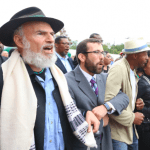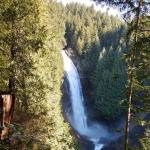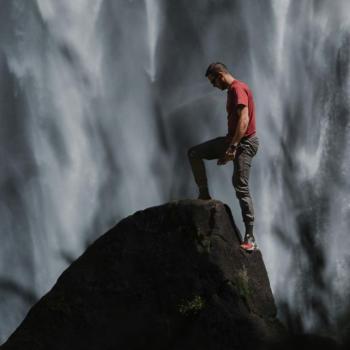I know that the future is uncertain and that anxiety is ever-present. Things aren’t looking too good. But I’m going to choose life and hope, hearing Moses’s words of promise: “God will cross over before you.”
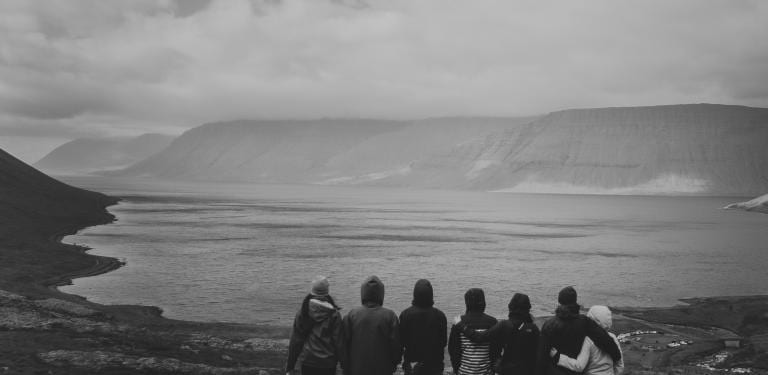
Texts: Deuteronomy 30:11 – 31:3a; Matthew 5:21-37
Finally, after four decades of wandering in the wilderness, Moses and the Israelites arrive at the Jordan River, the river that they will cross to enter into the Promised Land. But it is a bittersweet moment for Moses. Because God has told him that he will not be able to cross into the new land. At the age 120 years, he will only be able to see this land from a distance; he will not be able to enter it himself.
Moses’s life began at the river’s edge (the Nile). And it will end at the river’s edge (the Jordan).
But before he takes his leave, Moses gives them one heck of a last sermon. As he is preparing to give them his final words, I imagine him thinking back over his life. All they had survived in Egypt. The parting of the Sea of Reeds. The wandering in the wilderness. I imagine him thinking about the future of his people as they enter the Promised Land . . . without him and his leadership. And I imagine him asking himself:
“What kind of legacy am I leaving for my people? What am I teaching the children by my words and by my example? What values am I passing on to the next generation?”
Almost the entire book of Deuteronomy is Moses’ answer to these questions. These are his last words where he reiterates the commandments and the laws God has given them. We heard portions today where Moses passionately entreats them to follow these commands so that they might live and thrive, enjoying God’s blessings in the new land.
It’s a profound moment, and one that has relevance for us today. Like Moses, we ask ourselves, “What kind of legacy are we leaving behind? What are we teaching the children by our words and by our example? What values are we passing on to the next generation?”
Unfortunately, on many counts, we are living in a time where our society is, frankly, failing our children.
Every day we see our leaders at the highest levels openly and gleefully flouting every commandment of God—with no apparent consequences. The relentless lies, the dishonoring of people’s humanity, the policies that lead to suffering and death—all of these are symptoms of idolatry. Worshiping power, wealth, one’s own race and tribe. This is exactly what Moses tells the Israelites to be vigilant against.
Today is the moment of decision, Moses tells them.
If you follow the laws of God, God will bless you in this new land. But if your hearts turn away and you do not hear, you shall perish, and you shall not live long in the new land. Choose life.
These are stark words, aren’t they? It sounds so momentous, like there’s no turning back. It sounds like he’s putting before them a life-or-death decision . . . because he is. And this can make us uncomfortable.
Some of us are wary of this word “decision” because of the way it is used in high-pressure evangelical sales pitches like, “Make the decision for Christ!” But this is not how Moses is intending his speech. It’s not about individual salvation. It’s about how we will live in community with each other in the midst of so many conflicts and tensions.
The fact is, every day we make choices that can have an impact on the future.
Will we be ethical and act with moral integrity? Will we help those in need and work for justice? Or will we compromise the values we have been taught? Will we sell out for personal gain, or because of self-centeredness, greed, or simply because we’re lazy?
And in a time of climate and environmental crisis, there is one particular sentence from Moses’ sermon that is especially heart-piercing:
“I call heaven and earth to witness against you today that I have set before you life and death, blessings and curses.” (Deut 30:19)
Today, the pollution-choked air, land, and waters are indeed witnessing against us. The disappearing species and melting glaciers, the decimated forests and bleached coral are witnessing against us. Their testimony shows that we are choosing death and curses over life and blessings.
That’s why Swedish climate activist Greta Thunberg’s words are so poignant and so prophetic.
In her December 2019 speech to the U.N., her words have almost a Moses-like quality. She told the leaders that what is needed right now is a sense of urgency. But our leaders refuse to acknowledge it.
“In an emergency, you change your behaviour. If there is a child standing in the middle of the road and cars are coming at full speed, you don’t look away because it’s too uncomfortable. You immediately run out and rescue that child. And without that sense of urgency, how can we, the people understand that we are facing a real crisis. And if the people are not fully aware of what is going on, then they will not put pressure on the people in power to act. And without pressure from the people, our leaders can get away with basically not doing anything, which is where we are now. And around and around it goes.”
Hearing Greta’s words and reading Moses’s sermon, I find myself standing at the river’s edge with the Israelites, realizing that we are not even worthy to cross the water into a new land of promise. We haven’t earned the right. We don’t deserve this privilege. We’re afraid to even look ahead to the future.
I heard this lament on Monday evening in the deliberative dialogue about climate choices that I moderated at Phinney Ridge Lutheran Church in North Seattle.
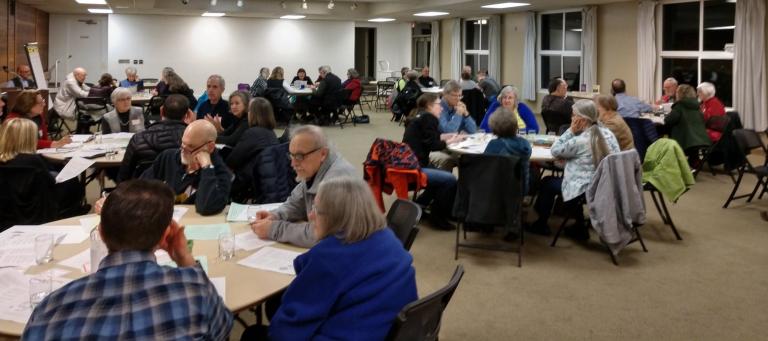
As we were sharing our experiences and concerns around the climate crisis, I heard people say things like:
“We’ve done such terrible things to the Earth, I’m not sure we even deserve to live on this planet.”
“I get so depressed thinking about what we’ve done. I’m really grief-stricken.”
“I’m worried that it’s too late, that we’ve already passed the tipping point.”
This is what I hear all over the country in discussions about the environmental and climate crises. It’s not just scientists and activists who say these words. They’re voiced by people in churches and synagogues I’ve visited. I hear it from students I teach. I hear it from other parents at my kids’ schools.
Maybe you are feeling this way, too. Maybe you know the feeling of standing at the river’s edge with the sinking feeling that there’s no way we’re going to get to the other side.
Perhaps Moses sensed this in his own people. And this is why he says one more thing after the admonitions and commandments. Knowing that they have fallen short, that they will continue to fall far short of what God commands and expects of them. Knowing that they have messed up before and will continue to mess up in the future. Knowing that they may be grappling with anxiety and paralyzing fear as they look to an uncertain future, Moses says this.
“The Lord will cross over before you.”
Do you know what that means? It means that the future is ultimately not determined by our mistakes or sins or bad decisions. The future is determined by God’s faithfulness, love, and power to forgive and restore.
That’s what happened for the Israelites. After all they put God and Moses through, after all the rebellion and complaining and sinning, you know what God did for them? God parted the water for them one more time. They sent the ark of the covenant out in front of the people as a symbol of their renewed commitment to God, and as soon as they stepped foot into the water, it parted. And they all crossed over on dry land.
Sound familiar? What a moment of realization that must have been for them. They were seeing that God was still with them, reminding them of all God had done for them before and will do for them in the future.
That’s why these last words from Moses are so important for the Israelites and for us. Because this is a time of preparing for the future. A time of transition, moving from wilderness life to life in community. A time of change in leadership. A new generation going from wandering in the wilderness to establishing a new home.
Greta, too, ended her U.N. speech pointing to the future, noting that this new decade will define our future.
“Right now we are desperate for any sign of hope. Well, I’m telling you, there is hope. I have seen it, but it does not come from the governments or corporations. It comes from the people. The people who have been unaware but are now starting to wake up. And once we become aware, we change. People can change. People are ready for change. And that is the hope because we have democracy and democracy is happening all the time…. In fact, every great change throughout history has come from the people. We do not have to wait. We can start the change right now. We the people.”
But I would add, Greta, for those of us who stand on the water’s edge with the Israelites, we who are shaped and formed by faith, that our hope comes not just from the people. Because people fall short. Even with the best intentions, people misjudge, people make mistakes, people sin.
So our hope comes from the only one whose justice and righteousness never changes and never fails. Our hope comes from God. God is waking people up. God is sparking that metanoia, that change. No, we do not have to wait. Because God is changing us right now, we the people.
You know, it is no coincidence that the very river where the Israelites crossed over will be the same river where Jesus is baptized.
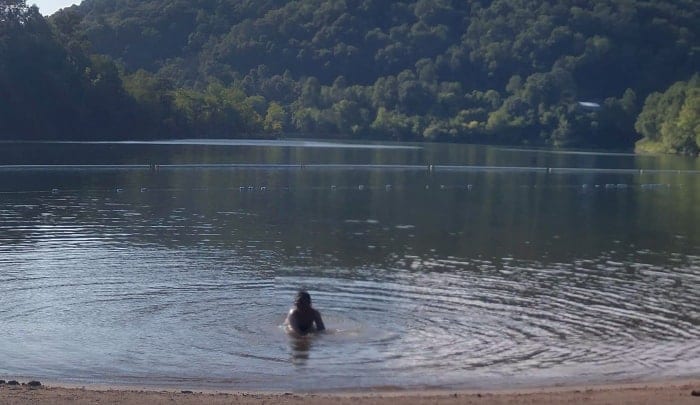
In the Gospel of Matthew, after emerging from those waters, he has his own wilderness experience, his own wrestling match with temptation and sin.
And when he comes out of that wilderness, he, too, will deliver his own sermon to the people. The Sermon on the Mount where, like Moses, he calls the people to a life of blessings, beatitudes. All of his teachings, including today’s reading, are about choosing life. Choose reconciliation instead of nursing grudges. Choose peace over violence. Choose to heal your relationships instead of destroying them in anger. Choose honesty, commitment, and fidelity instead of short-term pleasure that leads to betrayal. Choose honesty and integrity instead of lies and gaslighting. And to this we say, “Yes, yes!”
Listen, I know that the future is uncertain.
I know that the anxiety is ever-present. I know that we are, in fact, in a wilderness time of temptation and sin. And things aren’t looking too good. But I’m going to keep coming back to the water’s edge, hearing those words of promise: “God will cross over before you.”
Where you’re going, no matter what you face, God is already ahead of you. Jesus has already been through it. Remembering your Baptism is like standing on the water’s edge, hearing those words, “You are my beloved Child. I will cross over before you. I will never leave you. I am with you always.”
Every morning you wake up, you’re standing at the river’s edge.
Martin Luther said that as you wash your face in the morning, let that water remind you of your baptism, remind you of the person you were born to be, remind you that you are God’s child.
It is never too late to come to the river’s edge and let the water bring you back to God. Each day is a chance to begin again. Each Sunday is a chance to stand at the river’s edge and say, “I am baptized. I am God’s child. I choose life.” We choose life!
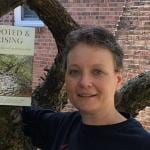
Leah D. Schade is the Assistant Professor of Preaching and Worship at Lexington Theological Seminary in Kentucky and ordained in the ELCA. Dr. Schade does not speak for LTS or the ELCA; her opinions are her own. She is the author of Preaching in the Purple Zone: Ministry in the Red-Blue Divide (Rowman & Littlefield, 2019), Rooted and Rising: Voices of Courage in a Time of Climate Crisis (Rowman & Littlefield, 2019), and Creation-Crisis Preaching: Ecology, Theology, and the Pulpit (Chalice Press, 2015).
Leah’s latest book is a Lenten devotional centered on Creation: For the Beauty of the Earth (Chalice Press, 2020).
Twitter: @LeahSchade
Facebook: https://www.facebook.com/LeahDSchade/
Read also:
The Proximity of Hope: An Easter Sermon
Is Your Dream Too Small? Or Too Big? A Rabbi, MLK, and a Revelation of Love


